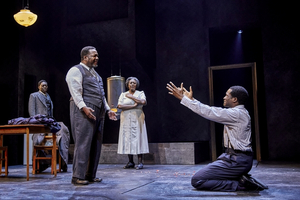Review: DEATH OF A SALESMAN, Piccadilly Theatre
|
![]() Following a sold-out run at the Young Vic, Arthur Miller's Death of a Salesman has transferred to the West End and, with blistering direction from Marianne Elliott and Miranda Cromwell, it remains one of the standout shows of the year.
Following a sold-out run at the Young Vic, Arthur Miller's Death of a Salesman has transferred to the West End and, with blistering direction from Marianne Elliott and Miranda Cromwell, it remains one of the standout shows of the year.
 The Loman family are here cast (by Charlotte Sutton) as an African-American family. Miller's tragedy of the common man is imbued with a racial dimension that heightens every detail of Willy Loman's difficulty as a travelling salesman: he must overcome the whispering about him when he enters an office, he warns his mistress that an inter-racial affair is illegal in certain states, and his boss, Howard (Matthew Seadon-Young), whom Willy has known since he was a child, recoils slightly at his touch.
The Loman family are here cast (by Charlotte Sutton) as an African-American family. Miller's tragedy of the common man is imbued with a racial dimension that heightens every detail of Willy Loman's difficulty as a travelling salesman: he must overcome the whispering about him when he enters an office, he warns his mistress that an inter-racial affair is illegal in certain states, and his boss, Howard (Matthew Seadon-Young), whom Willy has known since he was a child, recoils slightly at his touch.
The cumulative effect of these changes is most effective, and are made all the more potent by Elliott and Cromwell's direction. Often stylish and effective, the play draws you into Willy's mind with snapshots of his past. However, with sound and lighting design by Carolyn Downing and Aideen Malone respectively, there is also a distinct sense that these moments are fleeting, and as the actors move to the next scene, so too is there a sense of Willy's consciousness burning out.
Anna Fleischle's set design works in two parts. First are the blocky sections of grey stone that move up and down, forwards and backward, putting one in mind of M. C. Escher's print Relativity and the mental distortions Willy is experiencing. Secondly, the jigsaw pieces of Willy's life hang above the stage in the form of props, windows or door frames. Together, the features imply the fragile uncertainty of the Loman family, with the threat of a gust of wind upsetting the entire situation. What's to come, however, is a hurricane of quiet, powerhouse performances.
Though the shadow of Wendell Pierce's Willy is at first imposing, it is quickly replaced by the shell of a tired man. There is also anger, expressed mostly towards his son, Biff (the brilliant Sopé Dìrísù), and his general disregard for those whom he apparently deems not worthy, notably his other son, Happy (Natey Jones captures the role's childish enthusiasm with charm). It's difficult, in many respects, to like Willy, and yet when Pierce utters the words "A man is not a piece of fruit", a sour taste is as clear to the audience as it is to the character.
What can one say of Sharon D Clarke that has not already been said? Where previously she had played the explosive Caroline in Caroline, or Change and the seasoned Lady in Blues in the Night, Clarke's Linda Loman brims with pathos, futility and dignity. Though Willy talks of the decorum of engaging a man across a business table, it is when Clarke's Linda confronts both her sons in the kitchen that she slams her fist down and unleashes her reserved anger.
If one thing is lost in the transfer, however, it is the intimacy shared between the audience and the Lomans. Femi Temowo's gentle music and Clarke's musical laments of sadness are somewhat lost in the auditorium of the Piccadilly Theatre, though they are no less moving.
Elliott continues to strike gold in reinterpreting classic works, to keep them not only fresh but also to ensure the questions they prompt continue to resonate with audiences today. It's clear the questions raised about race, the impossibility of fighting against a changing world and the validity of the American Dream today have yet to be answered. As Linda says, "attention must be paid".
Death of a Salesman is at the Piccadilly Theatre until 4 January, 2020.
Photograph credit: Brinkhoff Mogenburg.
Read BroadwayWorld's interview with Sharon D Clarke about Death of a Salesman
Add Your Comment
Videos
